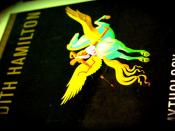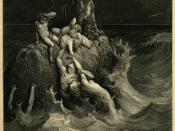The definition of mythology is deprived from the word 'myth'. The word itself comes from the Greek word 'mythos', which means fable, legend or sagas. The word "myth" is a story that seeks to rationalize the universe and the world around us, passed down orally from generation to generation explaining religious origin, natural phenomena or supernatural event. Mythology is a collection of myths that concerns with cosmogony and cosmology, shared by a particular society at some particular time in human history. Literature is a body of written works of language, period or culture. Literature can be divided into fiction (e.g. fairty tale, gothic, saga etc) and non-fiction (e.g. essays, journal, science fiction etc).
There are many distinctive natures of mythology and they seek to describe what a particular person or society believe during that period of time. Myths serves as an charter for their institutions, customs and beliefs. The typical mythology is the explanation of the universe and its ethology.
Normally, the setting is set in a previous proto-world (simliar to the current world but also different) and they often revolve around non-human or "extroadinary" people such as god, goddess, supernatural beings (e.g. zeus, adam and eve, prometheus etc). These story explains why things are and how they became to be. It 'rationalised' our way of thinking, reconcile us to reality and establishes our pattern of life. Apart from the explanation of the creation of the universe, mythologies seek to explain everyday natural phenomena. Certain myths explains way the sun exist and why there is night and day. Some explains the existance of seasons: Spring,Winter,Summer and Autumn while others shows of mother nature providing us with food and shelter. These myth suggest a way of understanding nature and organizing thoughts. For example, structualism recognizes different contrasting aspect (light and dark,


